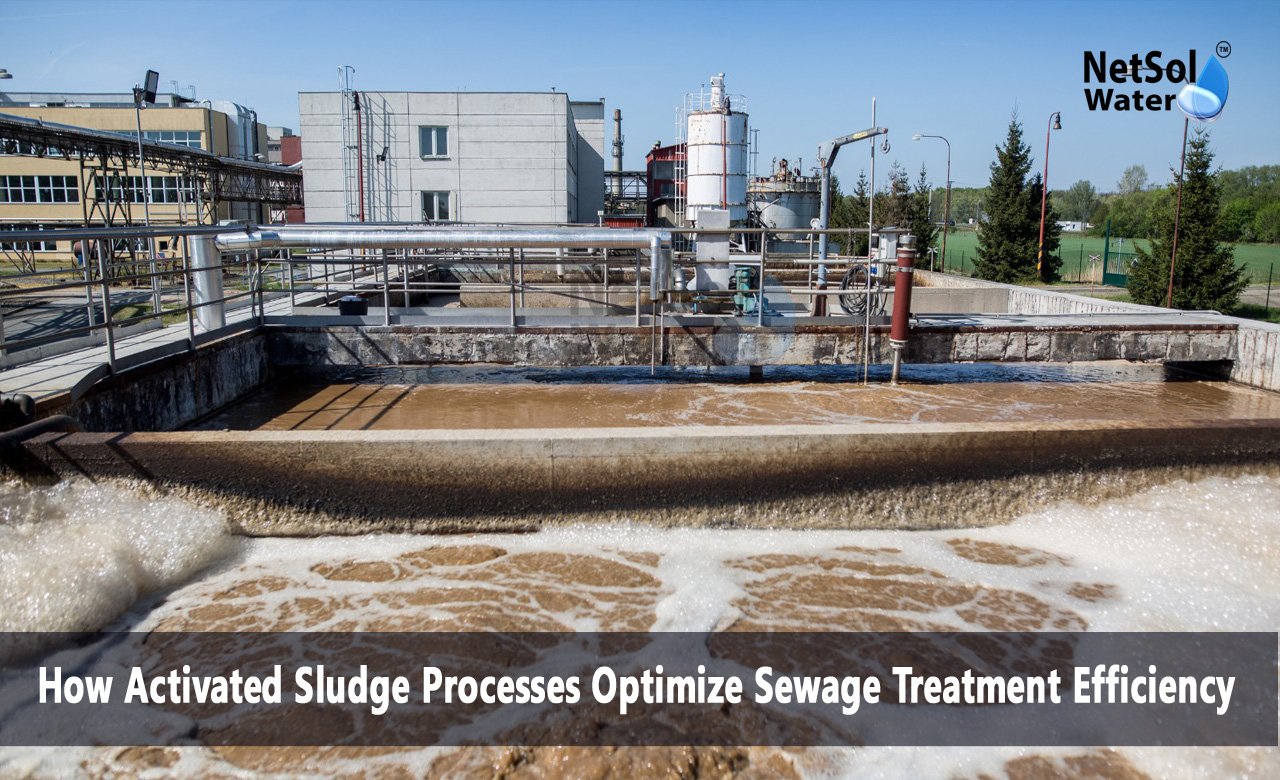Wastewater treatment is the most important part of maintaining our environment clean and healthy. An advanced sewage treatment plant plays a major role to achieve this by treating domestic wastewater, industrial wastewater, and commercial wastewater. Activated Sludge Process is one of the best processes implemented in these plants to treat the wastewater with high efficiency at a very rapid speed.
Here, in this blog, we will see how the process is carried out and why any advanced Sewage Treatment Plant needs it. Besides, if you are searching for a trustworthy partner in this regard, Netsol Water is the most trustworthy sewage treatment plant manufacturer, which provides systems complementing the activated sludge process to make it efficient and easy to use.
What is the Activated Sludge Process?
The Activated Sludge Process is the aeration of sewage wastewater to encourage microorganisms, which are mostly bacteria, to act on organic contaminants and waste materials to decompose them. It takes place normally in two steps: aeration and settling.
Aeration: Activated sludge is a community of microbes that are mixed with sewage wastewater in aeration tanks. With the supplement of oxygen, microorganisms will be able to metabolize and degrade organic contaminants.
Settling: Following aeration, wastewater is transferred to settling tanks (clarifiers), and activated sludge settles out as cleaner water is retained behind.
Besides eliminating a high percentage of organic contaminants, the process also eliminates suspended solids, thus effluent becomes safe for discharge or reuse.
How Activated Sludge Processes Optimize Sewage Treatment Efficiency?
Enhanced Removal of Organic Pollutants
Activated sludge systems work most effectively in the degradation of organic materials such as food waste, human feces, and other biodegradable materials from water. Microorganisms in the activated sludge metabolize such contaminants and break them down to harmless compounds. With this biological method, most of the organic pollutants are eliminated and cleaner and healthier water is left behind.
Activated Sludge Process offers consistent and uniform output, which makes it a widely employed process in sewage treatment plants all over the globe.
Capacity to Treat Wastewaters of Different Types
The second major benefit of the activated sludge process is that it is modifiable. It can be modified to treat different classes of wastewater, i.e., industrial, municipal, and agricultural effluents. By modifying parameters such as quantities of polluting material and treatment duration, the system can be adapted for individual treatment needs.
This is the secret of any Sewage Treatment Plant to provide treatment that is effective but economical.
Energy and Cost Efficiency
The activated sludge system is designed with energy efficiency in mind. Aeration, which is a critical component of the system, can be controlled to minimize energy usage without compromising the efficiency of treatment. This makes the activated sludge process both eco-friendly and cost-effective.
For those plants wishing to cut down on operating costs, the application of energy-efficient activated sludge systems can yield dividends in the long term. Operating a system that is uniquely designed to cater to particular demands, like the ones provided by Netsol Water, balances high performance with minimal energy consumption.
High Capacity and Scalability
Activated sludge systems have the capability to treat gigantic amounts of wastewater. This makes them ideal for small or large installations. Provision to expand capacity for treatment is assumed by a commanding role with the growth of a population or industries to cater to larger demands. Activated sludge systems have been discovered to be versatile in operation and can be adjusted to treat overflows, thus making continuous treatment with an expansion of the quantity of wastewater as well.
For big towns or for industrial purposes, scalability of the activated sludge process is particularly important in arriving at the best decision of a Sewage Treatment Plant.
Advanced Monitoring and Control
Advanced monitoring and control systems form a very important part of advanced activated sludge systems, which monitor the most important parameters such as dissolved oxygen, pH, and microbial activity. Advanced monitoring and control systems enable the operators to keep the microbial growth and treatment efficiency at their optimum level. Real-time monitoring enables the process to modify instantaneously so that the plant is run at its optimum efficiency.
Since Netsol Water is a top sewage treatment plant manufacturer, their activated sludge plants are equipped with state-of-the-art monitoring and control systems so that each phase of the treatment process is working smoothly and in a proper manner.
Conclusion
Activated Sludge Process is a pillar of contemporary sewage treatment plants that offers an efficient method of wastewater treatment using biological processes for the degradation of organic pollutants. Its efficiency, flexibility, and affordability have made it the preference of sewage treatment professionals globally.
For effective and eco-friendly wastewater treatment solutions at demand by business corporations, Netsol Water is leading the way astop sewage treatment plant manufacturer with the newest activated sludge technologies for optimizing treatment efficiency, conserving energy, and ensuring environmental compliance. With the addition of this new technology, Netsol Water enables industries and municipalities to obtain cleaner and healthier water that can be recycled or discharged into the environment at cost benefits to both.
Do you need an advice or assistance on selecting the best water and waste water treatment unit? We have solutions for all your problems!
Let us know your problem, our experts will make sure that it goes away.
For an assistance or related query,
Call on +91-9650608473 Or write us at enquiry@netsolwater.com



